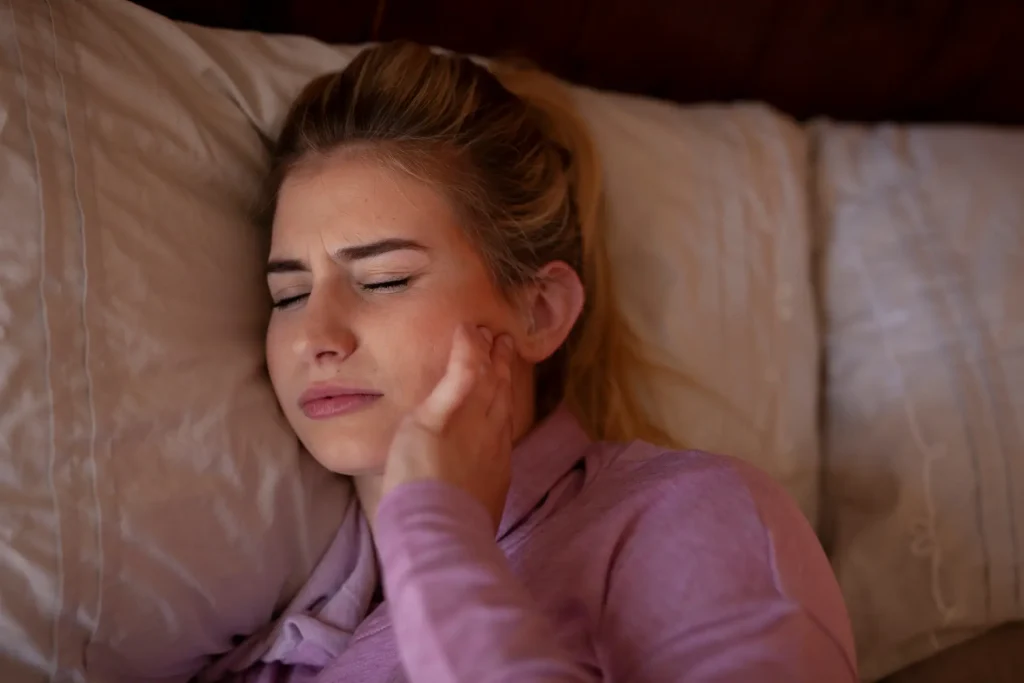
It’s estimated that between 5-10% of people have an underbite. The condition is barely noticeable in many cases, as the lower teeth may only rest slightly in front of the upper teeth. In more severe cases, the condition is very noticeable, and can lead to a whole host of health complications if left untreated.
A bite is considered normal if the upper teeth rest just in front of the lower teeth when the jaw is shut. Underbite occurs when the lower teeth rest in front of the upper teeth, resulting in a small or wide gap between the two sets. Regardless of the severity of your underbite, it’s important that you receive orthodontic treatment to avoid any health complications of the condition.
The main sign of underbite is the visual symptom of the lower teeth resting in front of the upper teeth when the jaw is shut. However, there are a number of other symptoms that may indicate an underbite or another form of malocclusion, including:
Like most forms of malocclusion, underbite generally results from dental or skeletal issues, but the condition can be exacerbated by both in some cases.
Here are some of the common factors that can lead to a patient having an underbite.
Underbite can be passed down through generations, and one of the most common causes of underbite is genetics.
Certain habits that start in childhood can also result in an underbite, such as:
Underbite can also stem from other factors, such as:
Neglecting to treat an underbite can lead to a range of health and social complications, as well as mental issues, such as:

An underbite can dramatically change the shape of a person’s face. It is likely to cause the chin to protrude, resulting in very low self-esteem. Children with underbites are more likely to be bullied by their peers, which can lead to chronic mental health conditions throughout childhood, adolescence and even into adulthood.

Underbite can severely impact a person’s ability to speak properly. /F/ and /S/ sounds will be particularly challenging to make, if not impossible. Speech problems like these will not only affect a person’s self-esteem, but it is likely to hold them back both socially and professionally.

The position of the jaw in cases of underbite places immense strain on the temporomandibular joint. This can lead to Temporomandibular Joint Disorder (TMJ), which creates the sensation of lockjaw and causes considerable pain.
Without effective treatment for the underbite and TMJ, a person is likely to experience chronic headaches, earaches, toothaches and even hearing problems.
Underbite can severely impact a person’s ability to chew or bite off pieces of food. This means they are more likely to choke, or bite their tongue and cheek when eating, damaging the soft tissues of the mouth. They may also become more reliant on certain teeth than others, increasing the likelihood of those teeth cracking, chipping and eroding prematurely.

Because mouth breathing is a common symptom of underbite, many people who have the condition also suffer from sleep apnea. This serious sleep disorder prevents a person from breathing momentarily throughout the night, severely reducing the quality of rest. Low quality sleep can lead to extreme exhaustion, decreased cognitive function, and mental illnesses such as anxiety and depression.
Underbites are a fairly common kind of malocclusion, so most kinds of braces can treat the condition. Braces will pull the lower teeth back if they are tilted forward, placing gentle pressure on the whole set until the bite is fixed.
Depending on a person’s priorities and budget, there are a number of suitable options, including lingual braces, ceramic braces, and self-ligating braces.
Clear aligners are one of the most popular forms of orthodontic treatment today, and it isn’t hard to see why. Working in the same way as traditional braces, they move the teeth gently over time, but are removable and virtually invisible to the naked eye. Clear aligners are thus an excellent choice for those who are self-conscious, or those who wish to achieve straight teeth without the bulkiness of metal braces.
Some cases of underbite can be treated by an upper jaw expander – or palatal expander. The orthodontic device is placed on the roof of the mouth, and places pressure on the upper teeth to move them outwards over time. This treatment is ideal for cases where the upper dental arch isn’t wide enough for the mouth.
A chin cap restricts the development of the lower jaw to prevent further expansion. This is a suitable option for patients in early childhood or adolescence, whose bones are still being formed.
This device wraps around the head, using metal bands attached to the upper teeth to pull the upper and lower jaws into alignment.
Some cases of underbite are caused by dental crowding, where the teeth don’t have enough space to align properly. In these cases, tooth removal may be necessary to alleviate pressure on the jaw and give the teeth space to align.
Surgery may be required in extreme cases of underbite. Spotting and treating the condition in early childhood will reduce the chances of a person needing surgery, but it may still be needed in severe cases. A licenced dentist or orthodontist will be able to advise if you will need surgery during a consultation.
If you suspect you have an underbite or other kind of malocclusion, it’s important to book a consultation with an expert. Treating dental issues early on can reduce the chances of health and social complications arising. Why not book an appointment with a local dentist or orthodontist to discuss your options?